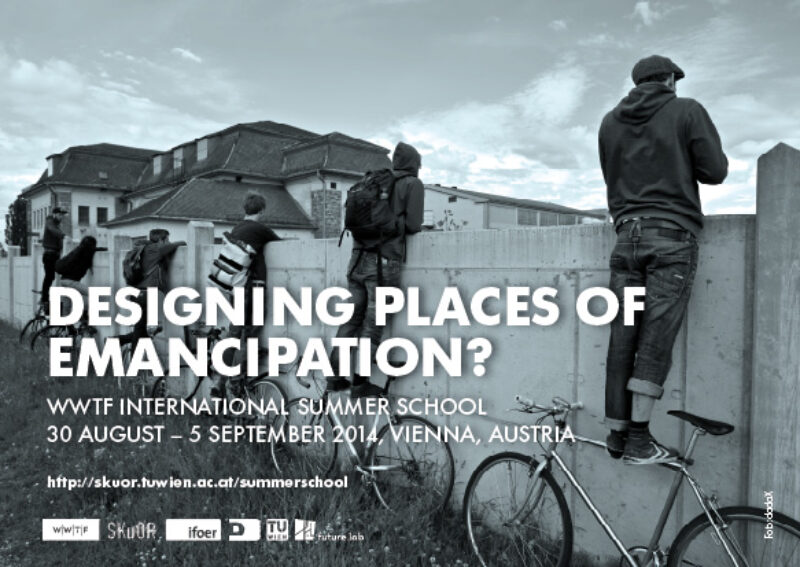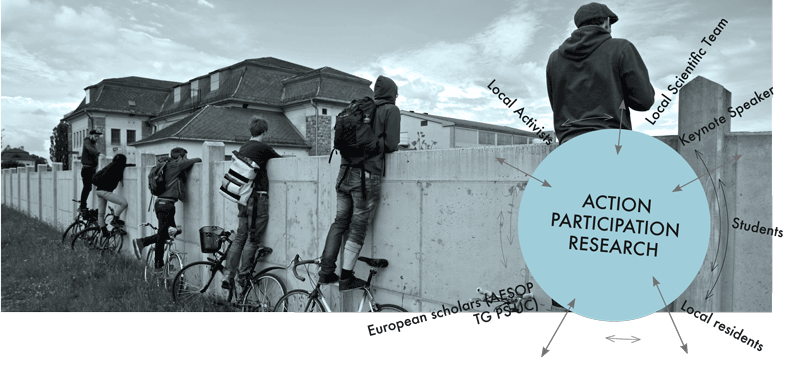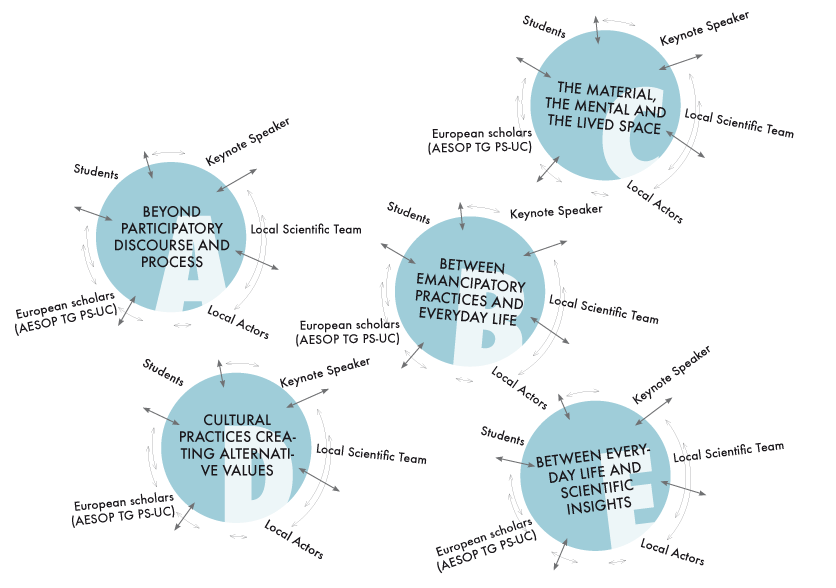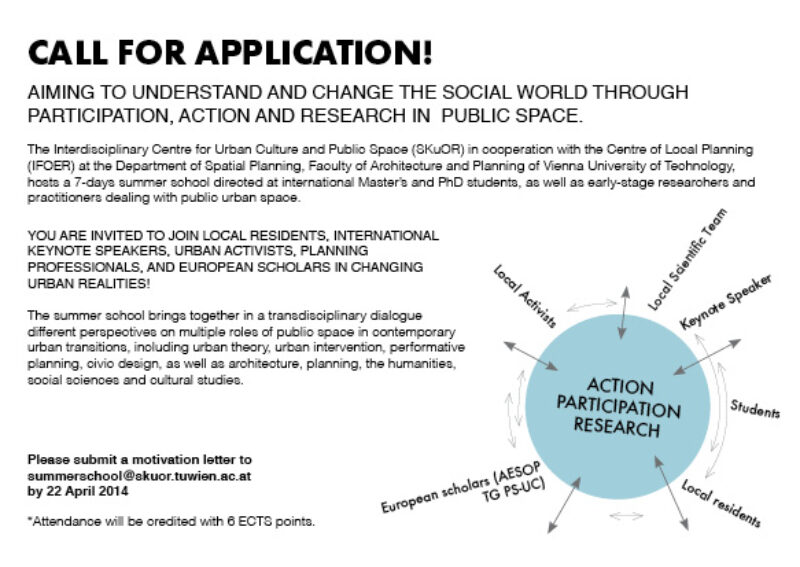Summer School 2014:
„Designing places of emancipation?
TU Wien
30 August – 5 September 2014, Vienna, Austria
Aiming to understand and change the social world through participation, action and research in public space.

The Interdisciplinary Centre for Urban Culture and Public Space in cooperation with the Centre of Local Planning (IFOER) at the Department of Spatial Planning, Faculty of Architecture and Planning of TU Wien, hosted a 7-days summer school directed at international Master’s and PhD students, as well as early-stage researchers and practitioners dealing with public urban space. Participants were invited to join local residents, international keynote speakers, urban activists, planning professionals, and European scholars in changing urban realities.
The summer school brought together different perspectives on multiple roles of public space in contemporary urban transitions in a transdisciplinary dialogue, including urban theory, urban intervention, performative planning, civic design, as well as architecture, planning, the humanities, social sciences and cultural studies.
Students and practitioners coming from various disciplines and cultural backgrounds were encouraged to apply.
Theme
Participants were encouraged to overcome own preconceptions and biases towards urban peripheries by embarking on an intuitive, exploratory journey to the outskirts of Vienna, to Floridsdorf. The summer school developed participatory action research concerning the Gasworks Leopoldau, a partly abandoned gas production plant in Vienna’s 21st district. The area, which covers approximately 13 hectares and includes several listed buildings (cultural heritage), has been partly vacant since 2006, transforming its meaning from a place of manufacturing into industrial heritage. At this place two seemingly opposite planning approaches meet: One concerns a city-led cooperative planning strategy aiming to develop a postFordist housing vision, the other is produced through the tactics of Viennese activists who seek to empower local voices and emancipatory practices related to everyday life.
The summer school took this situation as an opportunity to integrate situated learning experiences and a citizen-empowerment perspective in order to induce spatial changes that are meaningful for the local dwellers and civil society. It aimed to enhance the capacity of public space to mediate between different fields of knowledge (e.g. everyday, scientific, professional and practice-based knowledge). We worked in groups that bridge disciplinary and cultural differences in order to combine action and reflection in the neighbourhood. This means not only understanding the social world by doing urban studies, but also using urban research to experientially practice change. We critically reflected on and actively challenge the strategies and tactics of diverse actors and institutions that create spatial assets to “creativity” driven economies and certain societal groups. By embracing less formal domains of society, such as everyday cultural practices and open-source movements, we seeked to improve transparency of planning and design processes. This is crucial, as Vienna is promoting a diversification of lifestyles due to increasing migration, and an urban design policy focused on an ambitious growth scenario for the years to come.

Programme
The programme of the summer school spanned across 7 days, and included research walks and talks with local activists, NGOs and neighbours, five guest lectures by international keynote speakers and workshops supported by the local scientific team and members of the Thematic Group for Public Spaces and Urban Culture of the Association of European Schools of Planning. Invited guests not only “delivered” knowledge, but also joined in the practical teamwork. Local initiatives particularly provideed insights on emerging cultures and local needs, and supplied provocative questions related to the practical examination of the site and the topic. The workshops then put emphasis on the development of the action research approach and provideed room for feedback and exchange on participants’ work. The programme culminated with a self-organized public event which involved local residents.
Learning Fields
This summer school exploreed possibilities and limitations of participatory action research as an empowering catalyst for the constitution of city publics. The school was conducted in five teams, each engaged in one of five learning fields. Each team of six students was supported by a local actor, a keynote speaker, a member of the local scientific team and an European scholar.
The learning fields are:
Learning Field A
Beyond participatory discourse and process
(Keynote: Burcu Yigit Turan – Ozyegin University Istanbul, Turkey).
Learning Field B
Between emancipatory practices and everyday life
(Keynote: Jeff Hou –University of Washington, Seattle, USA und City of Vienna Visiting Professor 2013, Vienna UT, Austria)
Learning Field C
The material, the mental and the lived space
(Keynote: Anja Steglich replacing Angela Million – Technical University Berlin, Germany).
Learning Field D
Cultural practices creating alternative values
(Keynote: Anton Lederer – , Graz, Austria).
Learning Field E
Between everyday life and scientific insights
(Keynote: Rob Shields – University of Alberta, Canada and City of Vienna Visiting Professor 2014, Vienna UT, Austria).

Supporting Networks
An annual meeting of the AESOP Thematic Group on Public Spaces and Urban Cultures, a group operating under the institutional patronage of the Association of European Schools of Planning, was scheduled prior to the summer school (29 August 2014, Vienna). The meeting brought together researchers and practitioners from around Europe to discuss the current umbrella theme of Becoming Local in a transdisciplinary way. The meeting was open to all summer school participants.
Local Scientific Team
Sabine Knierbein, Theresa Schütz, Emanuela Semlitsch, Tihomir Viderman, Angelika Gabauer and Anna Vukan
Sponsors
The summer school has received funding and material support from the Wiener Wissenschafts- und Technologiefonds (Vienna Science and Technology Fund – WWTF) as part of the funding programme Public Spaces in Transition 2013. It has received additional budgetary support from the City of Vienna Visiting Professorship Programme 2013 at the Interdisciplinary Centre for Urban Culture and Public Space, the Department for Spatial Planning, the Vice Rectorate for Research and the Vice Rectorate for Academic Affairs, all at TU Wien. It is a pioneering project of the “Future Lab“ based at the Faculty of Architecture and Planning of the same university. It benefits from the active participation of members of the Thematic Group for Urban Cultures and Public Spaces of the Association of European Schools of Planning.


